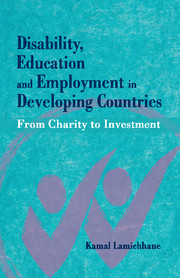Book contents
- Frontmatter
- Contents
- List of Tables and Figures
- Preface
- Acknowledgements
- 1 Fundamentals of Disability Studies
- 2 Disability and the Global Employment Situation
- 3 Disability and the Role of Education in Jobs: Case Studies from Nepal and the Philippines
- 4 Disability and Jobs in a Post-Conflict Country: Cambodia
- 5 Gender and Jobs: A Comparison between People with and without Disabilities in Bangladesh
- 6 Disability and Human Capital Investment
- 7 Disability, Poverty and Inequality: A Case Study in Nepal
- 8 Disability and Job Satisfaction Differentials
- 9 Disability and Determinants of Education: A Case from India
- 10 Disability and Barriers to Education
- 11 The Way Forward: Investment in Disability
- Index
- About the Author
9 - Disability and Determinants of Education: A Case from India
Published online by Cambridge University Press: 05 February 2015
- Frontmatter
- Contents
- List of Tables and Figures
- Preface
- Acknowledgements
- 1 Fundamentals of Disability Studies
- 2 Disability and the Global Employment Situation
- 3 Disability and the Role of Education in Jobs: Case Studies from Nepal and the Philippines
- 4 Disability and Jobs in a Post-Conflict Country: Cambodia
- 5 Gender and Jobs: A Comparison between People with and without Disabilities in Bangladesh
- 6 Disability and Human Capital Investment
- 7 Disability, Poverty and Inequality: A Case Study in Nepal
- 8 Disability and Job Satisfaction Differentials
- 9 Disability and Determinants of Education: A Case from India
- 10 Disability and Barriers to Education
- 11 The Way Forward: Investment in Disability
- Index
- About the Author
Summary
Introduction
Education is the cornerstone both for personal and national development and is recognized by international organizations and national governments alike as a fundamental and basic right. Universal education for all children was adopted as part of the United Nations Convention on the Rights of the Child. In a national address to America's schoolchildren on the importance of education and training, US President Barack Obama (2009) stated:
No matter what you want to do with your life – I guarantee that you'll need an education to do it. You can't drop out of school and just drop into a good job. You've got to train for it and work for it and learn for it … What you're learning in school today will determine whether we as a nation can meet our greatest challenges in the future. You'll need the knowledge and problem-solving skills you learn in science and math to cure diseases like cancer and AIDS, and to develop new energy technologies and protect our environment. You'll need the insights and critical-thinking skills you gain in history and social studies to fight poverty and homelessness, crime and discrimination, and make our nation more fair and more free. You'll need the creativity and ingenuity you develop in all your classes to build new companies that will create new jobs and boost our economy. We need every single one of you to develop your talents and your skills and your intellect so you can help us old folks solve our most difficult problems.
These remarks on the importance of education notwithstanding, a majority of countries have failed to provide full access to education for children with disabilities. Despite the commitments made in several international declarations, access to education for people with disabilities, particularly in developing countries, is still often elusive. It is estimated that there are between 120 million and 150 million people younger than the age of 18 with disabilities around the world, and that more than 90 per cent of children with disabilities in developing countries do not attend school (UNESCO 2009).
- Type
- Chapter
- Information
- Disability, Education and Employment in Developing CountriesFrom Charity to Investment, pp. 190 - 211Publisher: Cambridge University PressPrint publication year: 2015
- 1
- Cited by



